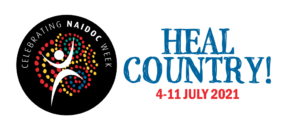NAIDOC Week (July 4 – 11) is a time for recognising and celebrating the many ways in which pride has been built in Indigenous communities, and for pressing that in their relationships to people and to the environment governments and other institutions show the respect which opens out to healing, writes ANDY HAMILTON SJ.
 This year the theme of the National Aboriginal and Islander Day Observance Committee (NAIDOC) Week is short, sharp and challenging. It is ‘Heal Country!’ It calls on all of us to continue to seek greater protections for our lands, our waters, our sacred sites and our cultural heritage from exploitation, desecration, and destruction.
This year the theme of the National Aboriginal and Islander Day Observance Committee (NAIDOC) Week is short, sharp and challenging. It is ‘Heal Country!’ It calls on all of us to continue to seek greater protections for our lands, our waters, our sacred sites and our cultural heritage from exploitation, desecration, and destruction.
It is challenging because it comes at a time when the prevailing apathy, carelessness and vandalism about the destruction of sites central to Indigenous culture and history has been challenged. The reaction to the destruction of the Juukan Caves Gorge in Western Australia aroused amazement and outrage outside Australia, and cost Rio Tinto and its investors reputation, money and the service of prominent office holders. Similar threats to heritage on Fortescue claims and on the Burrup Peninsula have also aroused widespread comment and will be difficult to ignore. The protests and publicity given them have shaken the insouciance of Australians to the importance of its history, revealed most strikingly in the blindness to the importance of preserving the national archives. An ancient Roman observer of these things might well suspect that the barbarians had taken over the Empire.
That is why the theme of NAIDOC Week is so timely. Heal Country has many meanings. It can mean healing a country sacred to its people which has been vandalised by exploitation. It might also mean healing a divided nation which treats its original people so disrespectfully. At a deeper level, it might mean healing a blindness and lack of respect for what should be sacred. This blindness sees human beings as no more than individuals in a competitive economy, ignoring their personal value and the complex and subtle relationships through time and space that shape them. It shows a lack of respect in particular for the relationship to the environment, which puts at risk the future of all Australians through global warming.
At Jesuit Social Services we are committed to all those exacting forms of healing, both of ourselves and of our society. The many Indigenous Australians among our staff and those with whom we work are our teachers and inspiration as we walk this path to a deeper respect.
The naming of the week and its emphasis belongs to the Aboriginal and Islander communities. But attending to the theme is the business of all Australians, not simply of ,Indigenous people. It is about forming the respectful and decent relationships that engender pride within communities. The Week is a time for engaging with one another, for recognising and celebrating the many ways in which pride has been built in Indigenous communities, and for pressing that in their relationships to people and to the environment governments and other institutions show the respect which opens out to healing.

